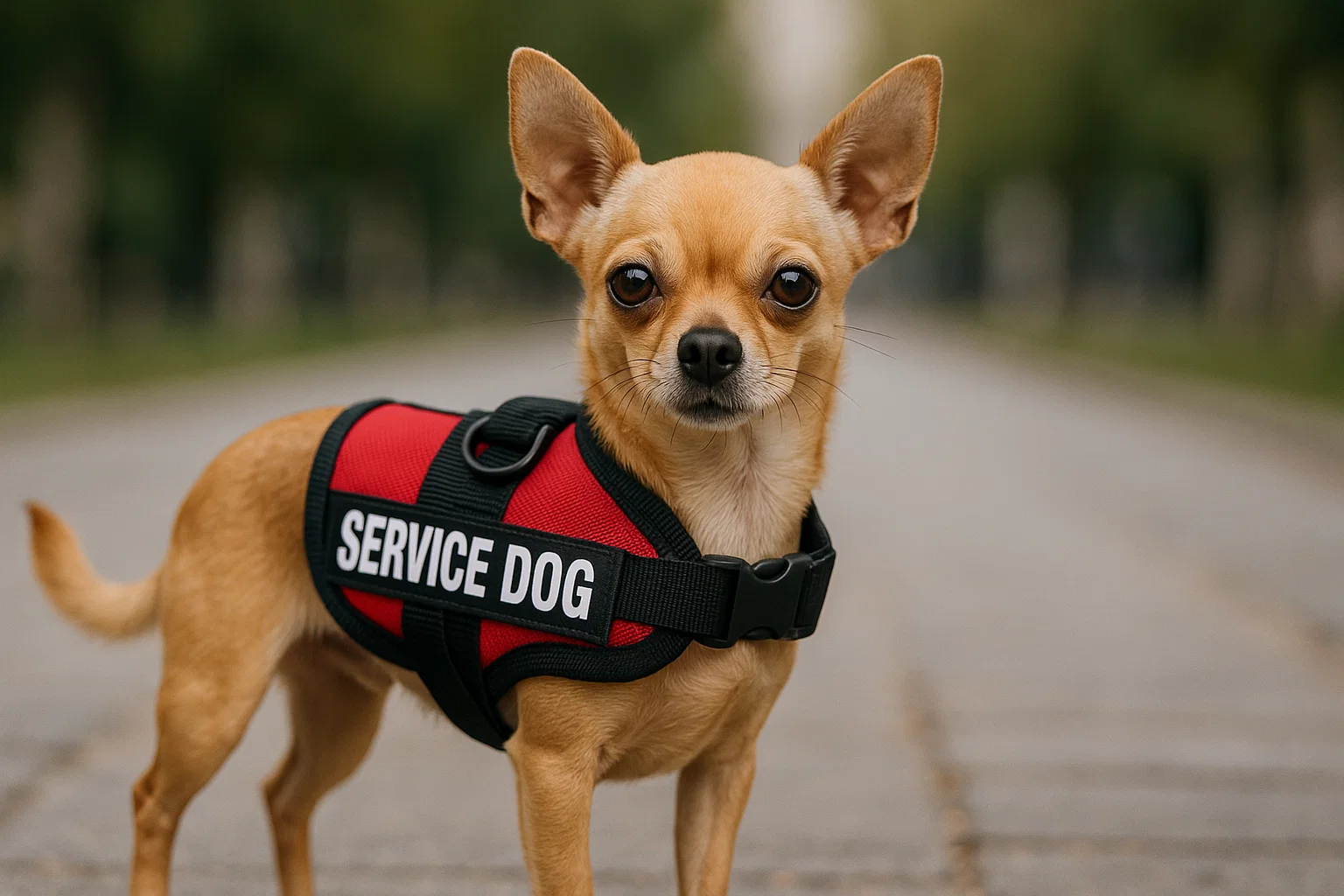Chihuahua as a Service Dog
Get Your Documents

Service dogs are fundamentally crucial to enhancing the lives of their handlers, providing a myriad of supportive functions from physical mobility assistance to medical alerting. While larger breeds often dominate the service dog landscape, small breeds like the Chihuahua have unique attributes that can also be beneficial in specific service roles. Let’s explore the potential of Chihuahua as a service dog and understand when they can be an ideal choice and when they may face limitations.
Chihuahua Overview
Chihuahuas are among the most recognizable and beloved dog breeds globally, known for their small stature and larger-than-life personalities. Originating from Mexico, these dogs are named after the Mexican state of Chihuahua. Despite their compact size, they often possess a confident and sometimes feisty attitude, making them intriguing candidates for specific types of service dog work.
Physical Characteristics
On average, Chihuahuas weigh between 2 to 6 pounds and stand about 6 to 9 inches tall. Their petite size makes them highly portable, easily fitting in small spaces, which can be an advantage for people who travel frequently or have limited living areas.
- Advantages:
- Portability: Easy to carry, whether on a plane or in a restaurant, facilitating constant companionship and accessibility.
- Space-efficient: Perfect for apartment dwellers or those with limited space, as they don’t require extensive physical areas to thrive.
- Limitations:
- Strength: Due to their size, Chihuahuas are not suitable for roles requiring strength, such as pulling a wheelchair.
- Temperature Sensitivity: Their small size and short coats make them vulnerable to cold weather, often necessitating protective clothing.
Temperament and Attitude
Chihuahuas are known for their alertness, intelligence, and spirited demeanor. They often form strong bonds with their handlers, exhibiting loyalty and affection that can be beneficial for service work. However, their temperament can be a double-edged sword in the context of service work.
- Advantages:
- Alertness: Their keen senses and quick reactions can be harnessed for tasks like alerting their owners to changes in their environment.
- Affectionate Nature: Chihuahuas are often very attuned to their owner’s emotions, making them suited to psychiatric support roles.
- Limitations:
- Distractibility: This breed can sometimes be easily startled or distracted, requiring thorough training for focus.
- Dominance: Some Chihuahuas display a stubborn streak, posing challenges during initial training phases.
Types of Service Work
While Chihuahuas may not be ideal for every service role, their specific qualities can be uniquely beneficial for certain types:
- Psychiatric Service Dogs: They excel in this role due to their strong emotional connection to their handlers and their ability to detect and respond to anxiety or PTSD episodes.
- Medical Alert Dogs: Chihuahuas can be trained to alert to certain medical conditions, such as seizures or changes in blood sugar, thanks to their alert nature.
Despite their potential in these areas, it’s crucial to recognize,
- Limitations:
- Physical Tasks: Tasks involving mobility assistance or balance cannot be performed by a Chihuahua due to their size and lack of physical strength.
Health Considerations
Chihuahuas, like all breeds, have specific health concerns that could impact their ability to work as service dogs. Prospective handlers should be aware of these when considering a Chihuahua for service work.
- Common Health Issues:
- Dental Problems: Small breeds are prone to dental disease, necessitating regular dental care.
- Patellar Luxation: A common joint issue where the kneecap dislocates, which can be problematic for mobility.
- Heart Conditions: Such as mitral valve disease, which may affect stamina and longevity.
Regular veterinary care and preventive measures are essential to maintain a Chihuahua’s health for consistent service work output.
Training and Suitability
Training a Chihuahua as a service dog requires understanding their unique blend of intelligence and sometimes stubborn personality. With the right approach, Chihuahuas can be trained effectively for particular service roles.
- Trainability:
- Chihuahuas are intelligent and can learn complex tasks but require patient, consistent training to overcome potential stubbornness.
- Positive reinforcement methods work best, helping them associate tasks with positive outcomes.
- Suitability:
- Their small size and attentiveness make them ideal for individuals who need a constant companion for psychiatric support or medical alert tasks.
- Early socialization is vital to ensure they remain calm and focused in various environments.
Summary of Chihuahua
In conclusion, while the Chihuahua may not be the ideal candidate for all the broad spectrums of service dog duties, they can excel in specific roles that match their size and temperament. Understanding their limitations and capitalizing on their natural instincts can make them invaluable partners for the right individuals. Below is a summary table highlighting key points.
Strengths:
- Highly portable and space-efficient
- Strong emotional bonds and alertness for psychiatric service
- Capable of medical alert tasks with proper training
Weaknesses:
- Limited physical strength for mobility assistance
- Health issues like dental and joint problems
- Susceptible to environmental sensitivities, like cold weather
Ideal Service Roles:
- Psychiatric support
- Medical alert
By considering both their strengths and areas in which they require extra care, prospective handlers can enhance the Chihuahua’s potential to serve effectively, transforming their relationship into an enduring partnership built on mutual understanding and support.
Get Your Documents
Example State Cards













